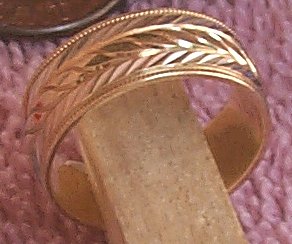Note, links to outside websites open in a new tab so you don't lose your place on Grahique Du Jour
There is more to metal detecting then buying a detector. There are many factors that need to be considered and there are many reviews and articles available on the subject. So I will only note a few observations from my experience for you. If you are a casual detectorist, then read no further.
1: If you are serious about the hobby, don't skimp on the quality of your tools. Whether it be your detector, digging tools, pin-pointing probes, scoops, search coils, etc. If you already own a metal detector and it does not perform as needed consider upgrading. For instance, I will not use cheap headphones, if you wish to hear those deep faint targets and properly eliminate outside noise, then you need quality headphones. The quality of your equipment makes a difference. One good find can pay for your metal detector or accessories.
 I note one example: After first acquiring my Shadow x5 ($1100 retail investment that pays), famous for its depth and sensitivity to gold. I went to Lake Worth Beach, Fl. to see what I could find also using quality headphones which canceled the noise of the waves and allowed me to focus on the deepest and faintest of signals. Following is the post I made about that search. I note one example: After first acquiring my Shadow x5 ($1100 retail investment that pays), famous for its depth and sensitivity to gold. I went to Lake Worth Beach, Fl. to see what I could find also using quality headphones which canceled the noise of the waves and allowed me to focus on the deepest and faintest of signals. Following is the post I made about that search.
This day in the dry sand I used Normal mode, Disc low 3, Sensitivity 8. I was digging lots of small foil up to 5 inches deep. My goal was the small gold jewelry. While detecting I received one of those near faint but clear, deep signals. Used my beach scoop to shovel out the sand. On the last scoop full, there was a ring of gold laying flat in the bottom of the hole. It was a 14k gold ring. I did not have a tape measure with me, but the depth was the equivalent to 1 1/2 times the length of my 9" beach scoop, making the ring at least 14" deep.
Absolutely amazing... as this beach is hit hard by several detectors daily. Thank you Troy!
2: If you are serious about the hobby, then support your local metal detecting club where you can try before you buy and get advice. Buy from a local dealer that will help you with every aspect of your needs and purchase, one who will be there for you after the sale.
3: If you are serious about the hobby, then do your due diligence before you invest in equipment. Subscribe to treasure magazines and read several books on the hobby so you are in the know about equipment, strategies, techniques and more. Even if you have been detecting for a few years, consider that you can still learn something new to help you achieve your treasure hunting goals.
4: If you are serious about the hobby, then practice using your detector and all it's features. It is like a musical instrument and will only perform as well as you are versed at using it. Use a test garden, test it in the field using various settings and various techniques until you find what works best. Know your detector so well that it becomes an extension of yourself. I have found that it takes 50 hours or more to become familiar with a new detector.
5: If you are serious about the hobby, then be disciplined when using your detector. For example, swing the coil the optimal speed for your detector, overlap your swings so as not to miss a target, search in a grid pattern with precision, scrub the ground with your coil (if your coil is 1" above the ground you lose 1" of depth). Practice, practice, practice like you would practice for any other competitive sport.
6: If you are serious about the hobby, then stay in shape and stay in practice. During the week after work at night I would go to the beach to detect for an hour or two maintain readiness. So when on a serious weekend hunt for many hours both days, I was ready and able.
7: If you are serious about the hobby, then you will have strategies for every hunting situation you encounter. For instance, when I would visit a well hunted local park I would avoid all the areas that detecting guides encourage one to search. Rather I would search the areas that other detectorists would avoid. This is just one of many strategies which I may write more about at a later date.
I note two examples: 1: At Northwest Park, in Lake Worth, Fl. I immediately went to the back of the park along an alley (the park as since changed). There were a row of wood posts into the ground to prevent cars driving onto the property, definitely not a promising area to detect. I began my search along those posts. Apparently a young person, took off their shirt and gold chain and placed it on the post, upon returning the chain fell into the weeds, remaining there for me to find, a 14k, 15 dwt. gold chain with cross.
2: The historic Seminole Inn in Indiantown, Fl. is on the main road through town. Across the street from the Inn are a couple of empty fields where there were yearly carnivals. Our club members, along with many other detectorists searched those fields over the years. When I was traveling through Indiantown for work, I scouted the area and realized I would have to think outside the box. I went to the back of the Inn and found the original sidewalk and grass swale along the road. That is where I would detect this next weekend. Sure enough, that small bit of ground along the street had never been searched and we made several nice finds. Read a short article about our search and Indiantown here.

8: If you are serious about the hobby, purchase a detector that you know you can easily learn to use and manage before buying the most expensive or advanced unit on the market. (I refer you to step 2 & 3)
One mistake I have seen many newcomers to the hobby make, is to buy the most expensive detector and advanced detector. Only to find out that their new machine is extremely difficult to learn and use and dissapoints them on every outing.
Or, the opposite mistake is made by purchasing a cheap beginners detector that disappoints them on every outing.
9: If you are serious about the hobby, have a detector equally suited to the type of detecting you will be doing. There are some great multi-purpose detectors that will work well in most situations. However if you wish to search the surf and shallow water, then get a detector that is suited for that purpose. If you will be nugget hunting, then you will need one designed for that purpose. Relic hunting and coinshooting, same thing. For example higher frequency detectors are more sensitive to gold and relics, lower frequency detectors to coins, single frequency detectors tend to allow a fast sweep speed, multi-frequency detectors a much slower sweep speed, and so on. When I am searching a mile of beach or relic hunting several acres through the woods, I need a fast machine to cover a lot of ground. I hope this all makes sense. The point is... I refer you to step 2 & 3 again. |
Tools, Accessories and more... scroll down for addl. articles.
Before You Buy that Metal Detector: 32 page Ebook
Introduction to Metal Detecting
Jim Fielding's Detecting An Attitude Blog: Based in Florida, member of the Central Florida Metal Detecting Club. Lots of useful articles, recommend highly.
Metal Detecting Hobby Talk Website: Excellent Articles on Buying Metal Detectors, Accessories and Hobby Investment Cost. Plus: use the menu on the top of his site to find a mulitude of additional hobby information, like seminars, videos, tips, news, laws and more.
UnderCoil: Very useful metal detecting tips and advice
Focus Speed - Joanna Jana Laznicka Previously with All Metal Mode Metal Detecting Blog and Dirt Digest Metal Detecting Magazine.
Detector Manufacturers
Helpful Articles
|

